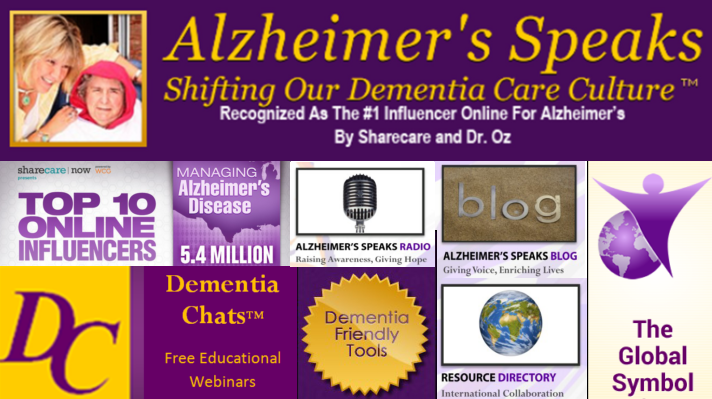Bringing Alzheimer’s Awareness to Everest
Bringing Alzheimer’s Awareness to Everest
It’s never easy to watch parents age. But, for those of us with parents or loved ones afflicted with neurocognitive disorders like Dementia and Alzheimer’s, it’s even harder.
Sometime in 2001, my dad was diagnosed with Multi-Infarct dementia at the young age of 50 years old. The diagnosis was later corrected as Lewy Body Dementia or, LBD. Over the past few years, my dad’s condition has deteriorated quite a bit, and it’s to a point where he doesn’t even remember or recognize me. It’s been a very emotional journey to see him decline day-by-day and, at the same time, it’s very frustrating that I cannot do anything about it, as dementia is a disease without a cure. I’ve gained so much experience in terms of knowing more about the disease itself, how to come to terms with it, how to deal with it — basically how to plan your life around it — so that you can give the utmost love and care to your loved one.
Here’s how I look at things – there was a time when I was born and my dad took care of me, and now I’ve been presented with this unique opportunity to be a father to my father. My wife and I do everything for him from sun up to sun down. We wake him up in the morning, draw his bath, change his diapers, prepare and feed meals, sing him songs, kiss him all day long, and finally put him to bed at night. Everything that he did for me as a child, I now do for him. And, as much as it pains me to see him in this state, I am a hundred times happier to provide a high quality of life for him. His every smile becomes an event to celebrate in our lives.
So this is how my life has been affected since his diagnosis; it’s been a difficult learning challenge and, yet, a wonderful experience at the same time. Instead of being sad, I would rather celebrate my dad’s life, and what he did for me, by giving him maximum love, comfort and quality of life.
And while caring for my father has been the most emotionally challenging experiences so far, I’m about to embark on the most physically demanding trial of my life by climbing Mt. Everest.
As a teenager in India, I watched a PBS NOVA documentary about Everest and was instantly fascinated by the mountain. When the first seeds were planted, I had no clue of what it would take to climb to the top. I just knew I wanted to stand on top of the world, without any inclination towards taking up mountaineering or climbing as a passion.
Back then, I didn’t even understand what passion truly meant or, for that matter, a word such as “mountaineering” existed. I was happy with my life full of friends and cricket. But, those documentary images of the scary Khumbu icefall, and the magnificent 3,000-foot ice-wall of Lhotse face, stayed with me in my subconscious. Then, one day in 2008, on a chance trip to the Himalayas with my supportive wife, we hiked to the summit of small peak called Hatu Peak. That was it. I realized that mountains were my calling and, since that day, I haven’t looked back.
It was during this time that I re-discovered my dream of climbing Mt. Everest, and decided to start training to achieve my goal and, here I am ready to leave for the journey I’ve waited twenty years to take.
I don’t like to think of this experience as overcoming an obstacle, for we can never conquer mountains. Instead, it’s the mountains that allow us to climb them and stand on their summit. Sir Edmund Hillary once said, “It’s not the mountain we conquer – but ourselves.”
Through my climb, I would like to raise awareness about dementia, Alzheimer’s, and other neurocognitive disorders not only for the diagnosed, but also for their families. I not only want to share my family’s story; I want to stand on top of the world and make my father proud.
Follow my Mt. Everest 2014 climb at my sponsors website CallFire’s, or check out our FUEL Facebook page
Wish Him Luck!
For More Information On Dementia And Caregiving
Click Below



Excellent article
you’re lucky that you’re able to get away to fill your dream
impossible with my mom
Thanks for your comment Suzette
Lori
This was a great article. By the way, there is a widely held misconception in the African American community that the Alzheimer’s disease is mostly a white disease. This is not only a false notion, it is a view fraught with danger for black people. There is a terrific book by author Will Gibson that dispels this falsehood. ESTELLA & SYLVIA, while a novel that tells a warm, loving family story, deals with many of the issues and challenges regarding Alzheimer’s.
As Frances Blake, a book lover who enjoys a good story while caring for her sick mother, says about ESTELLA & SYLVIA: “This is one of the most unique family stories I’ve ever read. I found myself rooting for the whole family. It also helped me as a caregiver. The book also helped my friends understand what I was going through. Most important, they enjoyed it immensely as good fiction.”—
http://www.amazon.com/Estella-Sylvia-Will-Gibson-ebook/dp/B00CVU3WV6/ref=la_B008TE5ZR2_1_4_bnp_1_kin?s=books&ie=UTF8&qid=1389736412&sr=1-4
It takes an incredible person to be such a caregiver.
I agree Babs